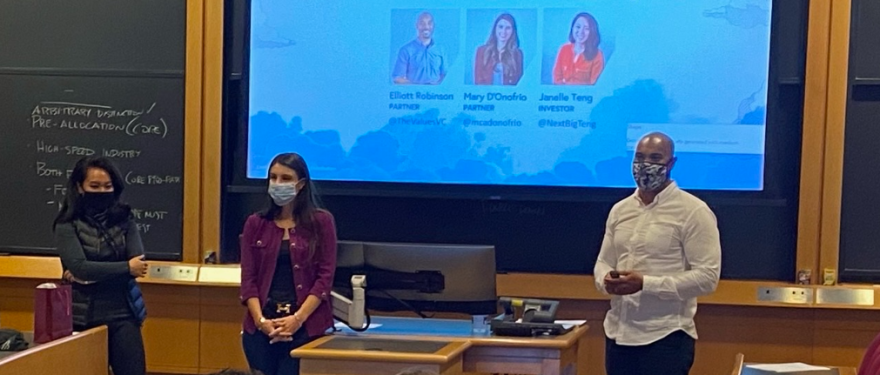Janelle Teng is from the Harvard Business School Class of 2020 and a proud member of Section C. While at HBS, Janelle was on the leadership team for the Venture Capital and Private Equity Club and the Women in Investing Club. She is currently a venture capitalist at Bessemer Venture Partners in San Francisco. She hopes that sharing her story will encourage everyone (regardless of background or prior experience) to make full use of the resources at HBS to explore and develop their interest in venture capital and entrepreneurship, as she would love to see more diverse voices in the industry and change the perception of what an “ideal VC” is.
When I was an MBA student, one of my favorite aspects of the case method was stepping into the shoes of the case protagonist to make a decision from their perspective. Yet never in my wildest dreams did I imagine that I would one day be featured as a case protagonist. From prominent CEOs to brave innovators, I had always viewed protagonists as inspiring role models and held great reverence for their storied careers and the impact they had made in their industries. Another reason I found it hard to envision myself as a real-life case protagonist was that a majority of the protagonists from the 500+ cases I read as an HBS MBA student did not look like or have a similar background as me, an Asian female immigrant.
After receiving repeated and direct feedback from students, the HBS administration made the drive for protagonist diversity a top priority in 2020. HBS committed to initiatives such as the “Juneteenth Case Pledge” and convened the Dean's Anti-Racism Task Force to work alongside the HBS Case Research and Writing Group to develop more inclusive and diverse teaching materials. Jan Rivkin, senior associate dean and chair of the MBA Program, noted that “our students are right that protagonist diversity matters. By studying cases with a wide diversity of protagonists, students learn that talent and leadership come from all backgrounds and identities. If students don’t understand that, they’ll worsen inequities, miss out on opportunities for themselves, and miss chances to create opportunities for others.”
As a member of the Class of 2020, my final semester and commencement was abruptly disrupted by the global pandemic. I graduated from HBS virtually and began my post-HBS career fully remotely as a venture capitalist at Bessemer Venture Partners. You can imagine how surreal it was for me to return to campus for the first time since graduating less than two years ago, not just as a proud HBS alumna, but as a female case protagonist in the first-ever case on Bessemer Venture Partners’ Century Fund in Professor Jo Tango’s Venture Capital (VC) and Private Equity elective class.

A special tradition at HBS is that the entire section signs a hard copy of the case when it is taught for the first time.
My return to campus was made even more memorable as I was joined by my teammates Elliott Robinson and Mary D’Onofrio to teach this case for the first time. The case focused on future growth strategies for the oldest active venture capital firm in the US, and how Bessemer had assembled a unique group to tackle this issue. Professor Jo highlights in the case that we “were among the most diverse teams in the VC industry, comprised of a Black male, a White female, and an Asian female.” HBS has reported previously that only 12 percent of check-writing decision-makers at the largest VC firms in the United States are women. And just 1 percent of check-writers are Black. My team recognizes that diversity of experience and thought are paramount to future success. “You can’t be what you can’t see” is a quote from Marian Wright Edelman that I think about constantly, especially since I went through the VC recruiting process so recently. Elliott, Mary, and I felt it was of utmost importance to make time for case interviews and to be present in the classroom to demonstrate to students that they could break into the VC industry even if they didn’t “look” like the traditional VC stereotype.
As a student, I had experienced firsthand how a diverse student body (across experiences, backgrounds, and identities) was a cornerstone of the richness of my time at HBS, both in and out of the classroom. Now observing on the other side as a case protagonist, the benefits of perspectives from diverse backgrounds shined through to me even more clearly, and was further amplified by case method interactions. The pre-class poll for the case had a fully split vote across four different options, and the most thought-provoking debates started from this place of no consensus, with students advocating for conflicting positions. Some of the most insightful comments came from students who had no exposure to the industry as they were able to view things with fresh eyes; ironically many of these students caveated their outstanding comments by starting with “my apologies if this doesn’t make sense since I don’t know much about VC.” While we attended class in the capacity as case protagonist guest speakers, my colleagues and I were fervently taking notes throughout the discussion and gained a lot of new perspectives which will no doubt influence our decision-making process moving forward on this live case.
Talent and leadership can come from anywhere and anyone. As an alumna, I am heartened to see that HBS is committed to ensuring that inclusivity and diversity (in terms of student body, faculty composition, case protagonists, and much more) is the foundation of the HBS experience. While there is still a long way to go on this front, I am excited for the students of today to become case protagonists and leaders of tomorrow, reflecting a vibrancy of different identities, beliefs, and backgrounds.

